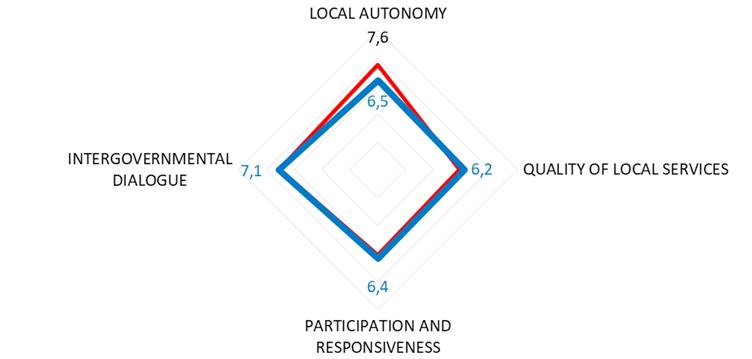
3 minute read
Devolution of State Power
by kdz_austria
2.2 Sectorial decentralisation and devolution of state powers
Decentralisation and the transfer of more power to municipalities is a key priority of the new Decentralisation Strategy adopted in 2019. The stated policy objective is to equip municipalities not only with communal responsibilities but make them responsible for managing a substantial share of sectorial responsibilities such as: education, social protection, economic development, environment protection, energy and agriculture. Sectorial responsibilities are very complex and they require not only relevant financial resources and powers but also adequate administrative capacities and human resources. The Government of Georgia made a decision to implement sectorial decentralisation in two stages. At the first stage, by delegating sectorial competences to municipalities while maintaining oversight function in the hands of line ministries and, at the second stage of the decentralisation process, by transferring these sectorial competences to the discretion of local authorities. The first stage of the sectorial decentralisation should take place in 2020-2023 and at the end of the implementation period, in 2025, all these delegated competences shall become own competences of local authorities. The first delegated task assigned to municipalities was capital maintenance of public schools; this task was delegated from the Ministry of Education and Science of Georgia. The special agreement on
Box 3 - Competences of Local Authorities
Area of responsibility
Own competences Local taxation and budgeting; Establishment and management of administrative units, municipal enterprises and non-commercial (social) entities Territorial organisation of the municipality and naming of streets and Geographical objects Local natural resources Socio-economic development and spatial planning Local roads and transportation Water supply, sewage and sanitation Solid waste management Public spaces, parks, cemeteries and green areas Shelter and childcare, protection of victims of family violence, shelter for homeless Protection of victims of family violence and protection of child’s rights and social status Preschool and additional education Organisation of Public-Private-Partnerships Regulation for pets in urban areas
Delegated competences
Collection of property tax Maintenance of public-school infrastructure Management of social agents’ service Monitor conditions of natural gas supply to households Regulate and control noise in urban settlements Provision of services to the children with disabilities for their integration into society Protection of child rights
Tasks implemented voluntarily
Support to agricultural cooperatives Promotion of local tourism Organisation of youth programs Support for SME’s
delegation of this task was signed between the ministry and each municipality that agreed to implement this delegated task. The ministry allocated 20 million GEL to compensate for the expenses of the implementation of this task by municipalities. However, not all municipalities agreed to take this task as they argued that the size of the compensation was not adequate for the massive task, given that public schools need heavy renovation, especially in the rural areas. Despite of disagreements on the size of the compensation, the majority of Georgian municipalities signed the agreement with the ministry on the delegation of tasks in the education sector at the beginning of 2020.
The next sectorial delegation that happened concerned the social sector. Georgia has a
quite complex system for social protection for vulnerable population based on a special assessment method that gives scores to each vulnerable household and financial assistance is allocated according to this score assigned by the social agent. This service was provided by the territorial divisions within the Ministry for Labor, Healthcare, Social Protection and Displaced Persons. The government of Georgia declared in 2019 that it plans to start decentralisation of the social security system by transferring the institute of social agents to local authorities. It was decided, that at the beginning, municipalities will manage this service as a delegated task under the supervision of the relevant line ministry and, if this delegation proves its efficiency, then from 2025 onwards the social security and protection of vulnerable population will become own competences of Georgian municipalities. The Parliament of Georgia adopted a new law “On rights of child” in May 2020. This law delegates to Georgian municipalities tasks to protect children from family violence and provision of services to children with disabilities for their integration into society. Thus, the next task delegated to municipalities in the social sector is the protection of child’s rights, rehabilitation programs and residential services for persons with disabilities.
Under the sectorial law of Georgia on Energy and Natural Gas Supply, Georgian municipalities received the task to monitor conditions of natural gas supply to households. Local authorities have the competence to approve engineering documentation for natural gas connections, issue safety certificates and oversight its enforcement. Administrative fines from violations of the regulation on natural gas supply and noise nomenclature go to the local budgets. Georgian municipalities have
Figure 3: Results of the Regional Decentralisation Observatory Index assessment in Georgia
Source: Regional Decentralisation Observatory Index in Georgia, NALAS 2020


